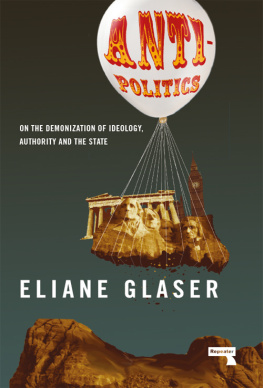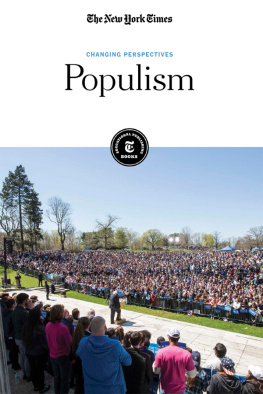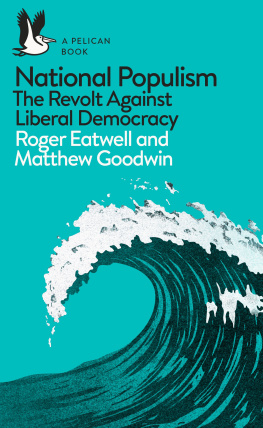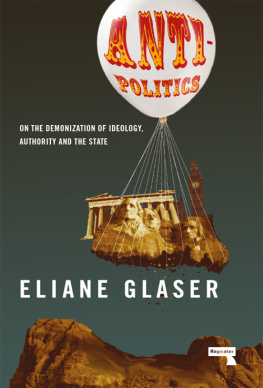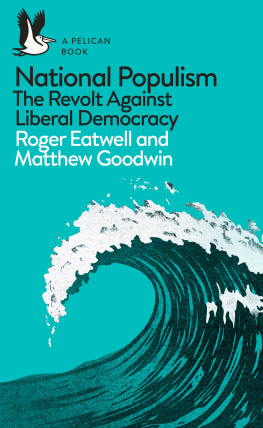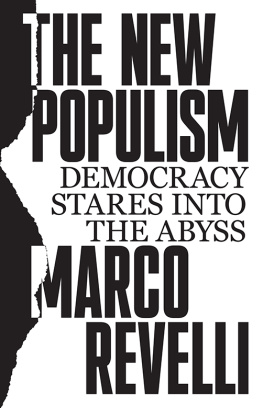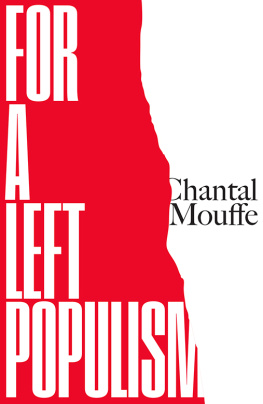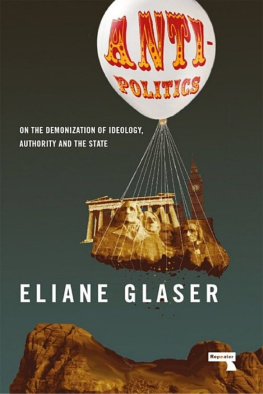ANTI-POLITICS:
ON THE DEMONIZATION OF
IDEOLOGY, AUTHORITY AND
THE STATE
ELIANE GLASER
ANTI-POLITICS:
ON THE DEMONIZATION OF
IDEOLOGY, AUTHORITY AND
THE STATE
ELIANE GLASER
Published by Repeater Books
An imprint of Watkins Media Ltd
19-21 Cecil Court
London
WC2N 4EZ
UK
www.repeaterbooks.com
A Repeater Books paperback original 2018
1
Distributed in the United States by Random House, Inc., New York.
Copyright Eliane Glaser 2017
Eliane Glaser asserts the moral right to be identified as the author of this work.
Cover design: Johnny Bull
Typography and typesett ing: Stuart Davies
Typefaces: Palatino
ISBN: 9781912248117
Ebook ISBN: 9781912248124
All rights reserved. No part of this publication may be reproduced, stored in a retrieval system, or transmitt ed, in any form or by any means, electronic, mechanical, photocopying, recording or otherwise, without the prior permission of the publishers.
This book is sold subject to the condition that it shall not, by way of trade or otherwise, be lent, re-sold, hired out or otherwise circulated without the publishers prior consent in any form of binding or cover other than that in which it is published and without a similar condition including this condition being imposed on the subsequent purchaser.
Contents
In memory of Mark Fisher
What is happening to us in the early years of the century is something that would appear not to have any clear name in any accepted language.
Alain Badiou, The Rebirth of History: Times of Riots and Uprisings
The old gods are aging or are already dead, and others are not yet born.
Emile Durkheim, The Elementary Forms of the Religious Life
Introduction
This book started life five years ago, when I started observing and commenting on a set of emergent tendencies: the disavowal of ideology, the rise of populism, and a profound confusion surrounding political authority, the kind of democracy we want, and the role of the state in the twenty-first century. It seemed to me that these tendencies were interrelated. They were about a widespread opposition to politics or at least politics as we know it. They embodied a general sense that our system has become outmoded, defunct and obsolete. And they expressed an uncertainty about whether politics could be revived and what possible form that could take.
And then, of course, these tendencies burst into the mainstream. Populism is suddenly everywhere, and anti-politicians have taken charge. An American president has set about dismantling the institutions of government. A British MP has been murdered and many others have faced trolling and threats. Westminster is crumbling, literally and metaphorically. Parliamentary democracy is a hollow sham. Professionalised and robotic MPs mouth a series of indistinguishable and mangled propositions. The public is cynical and disengaged. Traditional class identities and affiliations are breaking down. What was once a coherent public conversation on policy issues is fragmenting, as newspaper readership dwindles. Following the shock result of the EU referendum, Parliament has been cowed by a pernicious compound of oligarchy and majoritarianism.
When I began work on this book, the trend towards post-politics was coming from the marketised post-democracy of the neoliberal Right, but also from the radical Left from what Alex Williams and Nick Srnicek call folk politics: alternative democratic experiments and the deliberate refusal to make demands. Neoliberalism is now combined with a virulent right-wing populism, and this is both destroying mainstream politics and taking it over. Yet we saw signs of hope in the 2017 general election, with Jeremy Corbyn making unexpected gains, and public opinion shifting to the left. Suddenly it seemed that formal politics was not defunct after all. The implications of this have not yet been absorbed and incorporated on the Left. One of the central contentions of this book is that the Left needs to think in a joined-up way about the relationship between marginal and mainstream politics, and not consign the latter, iconoclastically, to the dustbin. After all, if the political system is a dinosaur, why is it now coming back to life?
With events moving so fast, any book about the state of politics is a hostage to fortune. Yet I believe that to give up on writing about the big picture is to accept that our only possible mode is fire-fighting. If we only write about politics in journalistic form, our commentary will be restricted to the topical and the reactive we wont see the wood for the trees. In the all-consuming and all-erasing daily news churn, as Guardian readers reload the homepage once again and Twitter users scroll down their feeds, its difficult to get hold of the subtext to feel situated in a historical moment; to grasp how we got to be in this predicament and what its characteristics signify in the grand scheme of things. This book is a reflective intervention at a critical juncture. It makes the case that we need to ask the big questions, think clearly and anatomise our impasse if we are to strategise our way out of it.
Because for all the commentary about politics in the media and the public conversation, I dont think we really know how to answer or even frame some fundamental questions. Why has politics, as a thing, become so toxic that a member of Tony Blairs cabinet, Charles Falconer, could promote the depoliticising of key decision-making? If we are all desperate for some sincere idealism in politics, why has the word ideological become an insult? If politicians of all stripes and campaigners alike now advocate for grassroots community and local autonomy, what role is left for the public sphere and the state? What is the right size for a jurisdiction: local, national, European, global? What is democracy, rightly understood: representative, or direct and participatory? Does authority have any rightful place in politics? In a postmodern age when history itself seems to have ended and grand narratives seem a thing of the past, is the death of politics an inevitable sign of the times; or is it the result of careful right-wing manoeuvring? In other words, is post-politics disproportionately affecting the Left? And is politics per se dead, or just its traditional form? This book attempts to offer some answers, or at least to crystallise the big questions that lie beneath these dynamic, baffling times.
* * *
Its curiously difficult to encapsulate in words whats happening to politics. In part, this is because so much of it Brexit, Trump and so on was not predicted. This is in itself dismaying: after nearly four decades of neoliberal dominance, why would people assume the situation was set to improve? Yet although such events may have seemed unthinkable in political and journalistic discourse, in literature, film and TV the dystopian despot is a tired staple from Citizen Kane to The Simpsons. The media has not built up its capacity to anticipate and critique these figures; yet they are also somehow too clichd to even parody. Furthermore, the protagonists we wish to lambast have already got there with the self-aware irony: Donald Trump has said that his own favourite film is Citizen Kane a Putin-esque theatrical reflexivity that makes critics look po-faced.
Furthermore, journalistic commentary cant help but take on the received terminology of the day, which is opaque, circular and constrained by the Overton window, a concept defined by the political scientist Joseph Overton as the range of ideas the public will accept. As the philosopher Roberto Unger notes, the Overton window is not in reality fixed; its a bastardised conception of political realism which is proximity to the existent. The word Brexit is an example of this a word that gains currency, validation and meaning it doesnt deserve through frequent political and journalistic usage. It characteristically combines the mangled zombie lexicon of Westminster briefings with the veneer of vernacular informality. Deploying the accepted terminology defines you as part of the conversation, but the conversation is not connected to any theoretical or historically contextualised understanding of what is going on. So much of what we see around us is paradoxical the people just want to see the system shaken up on the one hand, or the people just want a confident leader on the other. The media deals alternately in these utterly opposed clichs, without joining the dots and questioning the cognitive dissonance.
Next page
